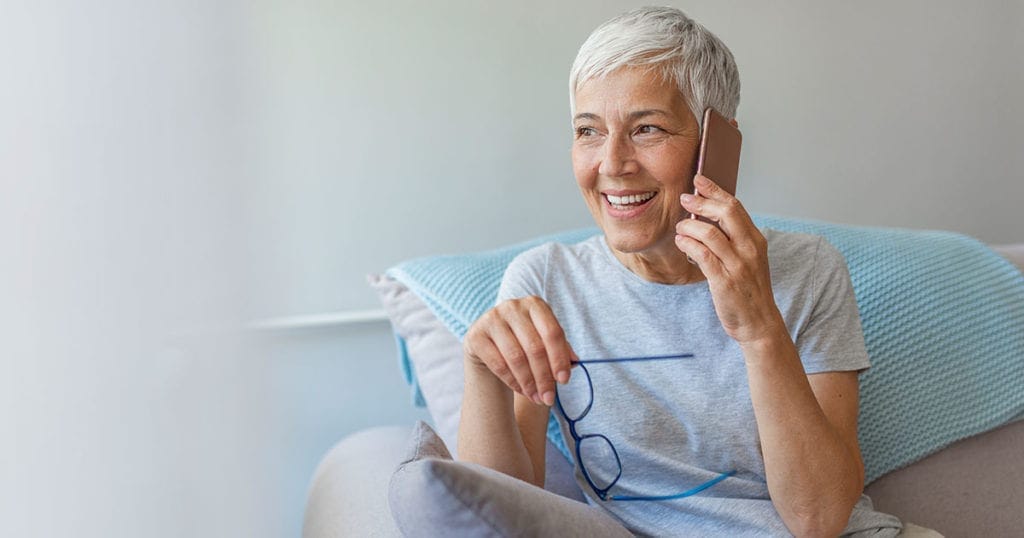As we grow older, our social circles often grow smaller. Retirement means we no longer interact with colleagues and community members on a daily basis. Changes in our physical abilities may make going out difficult. Over time, our friends may move away for new opportunities or to be closer to family.
All of these factors can inadvertently lead to social isolation and senior depression, which can impact our health, especially as we age. Keep reading to learn more about the health benefits of social interaction, to get key senior health tips and to discover pandemic-friendly activities for seniors.
Maintain Your Health with Social Interactions
Senior or elderly loneliness is a risk factor for functional and cognitive decline. Increased social isolation can be detrimental to seniors, both emotionally and physically. In fact, senior isolation is a major risk factor for premature death according to The National Institute on Aging. This is why we can’t stress enough the importance of socialization for adults and seniors alike.
How can regular social activities, like talking to friends or connecting with family, help your health? Let’s find out.
1. Lower risk of dementia.
Talking on the phone, going to a book club, seeing family over the holidays—all of these things are good for your brain health! Studies have shown that seniors who maintain active social lives may lower their risk of memory loss and dementia.
Researchers at the Harvard School of Public Health found that socially active seniors had a slower rate of memory decline. In another study, seniors with larger social networks, who participated in three or more social activities, performed better on cognitive tasks than seniors who didn’t participate in any social activities.
2. Decrease risk of depression.
Contrary to what some may believe, depression is not a normal part of getting older. Though elderly depression symptoms and severity may vary, depression does affect more than 6.5 million Americans over the age of 65 to some degree. The Centers for Disease Control states that depression is common in older adults with other illnesses or limited mobility.
Socializing regularly can boost your feelings of well-being and keep you connected to the world around you. Both of these things can decrease your risk of depression.
3. Improve physical health.
An active social life can work wonders for your mental health. Often, regular social activities can lead to better physical health too. Social engagement has been associated with a stronger immune system, better nutrition and more exercise.
When seniors live alone or are extremely isolated, they are more likely to experience malnutrition and less likely to engage in physical activity. Loneliness can also put seniors at a greater risk for certain conditions such as heart disease and stroke.
How Can You Stay Social?
Retirement communities offer the independence and support you need to have new adventures and stay active. However, the COVID-19 pandemic puts those 65 and up at a greater health risk and can make socializing today a challenge.
However, the COVID-19 pandemic puts those 65 and up at a greater health risk and can make socializing today a challenge.
At the Terrace, we are putting our residents’ health and safety first, which means encouraging social distancing and pausing or altering many of our usual activities.
Here are some tips for remaining socially active:
- Write letters. Spend some time writing letters to friends and family members and ask them to write to you in return. If you want something fun for the whole family, involve your grandkids! You can ask them to share drawings and photos. They’ll have fun creating something for you, and you’ll enjoy receiving it.
- Use email and FaceTime. There are so many ways seniors in isolation can connect virtually. You can email friends and family members to stay in touch. You can also check in face-to-face (or screen-to-screen!) using platforms like FaceTime or Skype. Set a recurring time for you and your family to connect each week.
- Read aloud over video chat. Video chat isn’t just for catching up. Use it to spend quality time with your grandchildren or loved ones. You can find creative ways to do the things you once did, like reading to them aloud, singing a lullaby, or even playing a game—all through video.
- Host a virtual party. Connect with your family and fellow community members by hosting a virtual gathering! Get on-screen together to catch up and share laughs.
- Go on a virtual tour. If you like a museum or national park tours, you can now do these things virtually. By sharing your screen during a video call, you can tour the world with friends.
- Watch a church service from home. Many churches have begun to host services online. With a platform like Facebook Live, you can watch and interact with other churchgoers through comments and likes.
- Take an online exercise class. Tune in for live or on-demand fitness classes that can make you feel like you’re exercising with a group again. Take live classes with friends or other residents to help you stay accountable.
Socialization is important for your health. At the Terrace, we do all we can to help you feel like you’re a part of a community—no matter the circumstances.
Are you ready to give independent living a try? Contact us online or give us a call at 573-875-2538.






